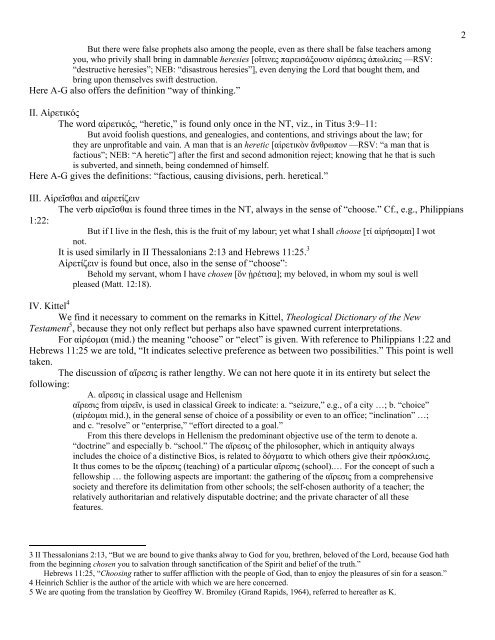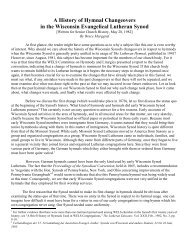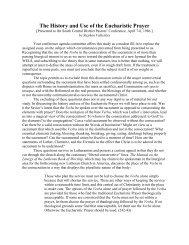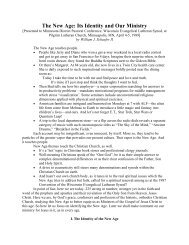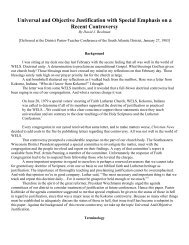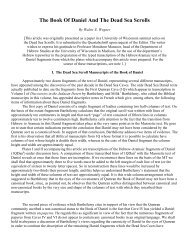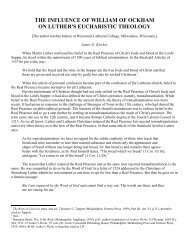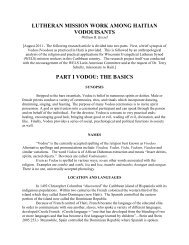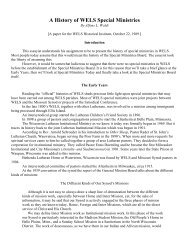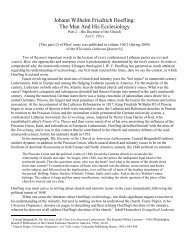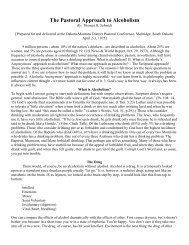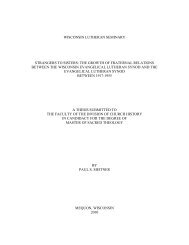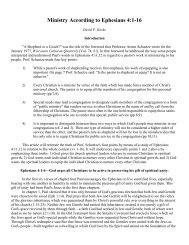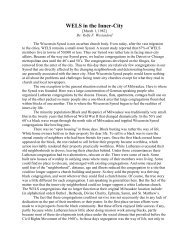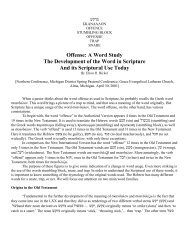What Is Heresy? - Wisconsin Lutheran Seminary Library: Essays
What Is Heresy? - Wisconsin Lutheran Seminary Library: Essays
What Is Heresy? - Wisconsin Lutheran Seminary Library: Essays
You also want an ePaper? Increase the reach of your titles
YUMPU automatically turns print PDFs into web optimized ePapers that Google loves.
But there were false prophets also among the people, even as there shall be false teachers among<br />
you, who privily shall bring in damnable heresies [οἵτινες παρεισάξουσιν αἱρέσεις ἀπωλείας —RSV:<br />
“destructive heresies”; NEB: “disastrous heresies”], even denying the Lord that bought them, and<br />
bring upon themselves swift destruction.<br />
Here A-G also offers the definition “way of thinking.”<br />
2<br />
II. Αἱρετικός<br />
The word αἱρετικός, “heretic,” is found only once in the NT, viz., in Titus 3:9–11:<br />
But avoid foolish questions, and genealogies, and contentions, and strivings about the law; for<br />
they are unprofitable and vain. A man that is an heretic [αἱρετικὸν ἄνθρωπον —RSV: “a man that is<br />
factious”; NEB: “A heretic”] after the first and second admonition reject; knowing that he that is such<br />
is subverted, and sinneth, being condemned of himself.<br />
Here A-G gives the definitions: “factious, causing divisions, perh. heretical.”<br />
III. Αἱρεῖσθαι and αἱρετίζειν<br />
The verb αἱρεῖσθαι is found three times in the NT, always in the sense of “choose.” Cf., e.g., Philippians<br />
1:22:<br />
But if I live in the flesh, this is the fruit of my labour; yet what I shall choose [τί αἱρήσομαι] I wot<br />
not.<br />
It is used similarly in II Thessalonians 2:13 and Hebrews 11:25. 3<br />
Αἱρετίζειν is found but once, also in the sense of “choose”:<br />
Behold my servant, whom I have chosen [ὃν ᾑρέτισα]; my beloved, in whom my soul is well<br />
pleased (Matt. 12:18).<br />
IV. Kittel 4<br />
We find it necessary to comment on the remarks in Kittel, Theological Dictionary of the New<br />
Testament 5 , because they not only reflect but perhaps also have spawned current interpretations.<br />
For αἱρέομαι (mid.) the meaning “choose” or “elect” is given. With reference to Philippians 1:22 and<br />
Hebrews 11:25 we are told, “It indicates selective preference as between two possibilities.” This point is well<br />
taken.<br />
The discussion of αἵρεσις is rather lengthy. We can not here quote it in its entirety but select the<br />
following:<br />
A. αἵρεσις in classical usage and Hellenism<br />
αἵρεσις from αἱρεῖν, is used in classical Greek to indicate: a. “seizure,” e.g., of a city …; b. “choice”<br />
(αἱρέομαι mid.), in the general sense of choice of a possibility or even to an office; “inclination” …;<br />
and c. “resolve” or “enterprise,” “effort directed to a goal.”<br />
From this there develops in Hellenism the predominant objective use of the term to denote a.<br />
“doctrine” and especially b. “school.” The αἵρεσις of the philosopher, which in antiquity always<br />
includes the choice of a distinctive Bios, is related to δόγματα to which others give their πρόσκλισις.<br />
It thus comes to be the αἵρεσις (teaching) of a particular αἵρεσις (school).… For the concept of such a<br />
fellowship … the following aspects are important: the gathering of the αἵρεσις from a comprehensive<br />
society and therefore its delimitation from other schools; the self-chosen authority of a teacher; the<br />
relatively authoritarian and relatively disputable doctrine; and the private character of all these<br />
features.<br />
3 II Thessalonians 2:13, “But we are bound to give thanks alway to God for you, brethren, beloved of the Lord, because God hath<br />
from the beginning chosen you to salvation through sanctification of the Spirit and belief of the truth.”<br />
Hebrews 11:25, “Choosing rather to suffer affliction with the people of God, than to enjoy the pleasures of sin for a season.”<br />
4 Heinrich Schlier is the author of the article with which we are here concerned.<br />
5 We are quoting from the translation by Geoffrey W. Bromiley (Grand Rapids, 1964), referred to hereafter as K.


